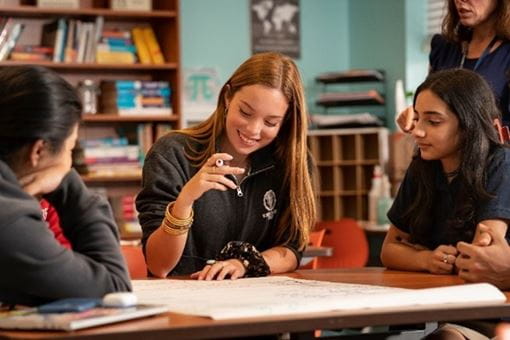We use cookies to improve your online experiences. To learn more and choose your cookies options, please refer to our cookie policy.

In the ever-evolving world of education, the approach to how we assess students has always been one of the ‘hot potato’ topics dividing educators, parents, students and academics.The trend over the last ten years has seen a push back from modular—or continuous—assessment to a focus on high stakes end-of-course exams.
But what’s the best way to go?In short, thereisn’t a single right answer. It’s all about recognising that students aren't all cut from the same cloth—some might thrive under the pressure of a big exam, but others? Not so much. And that's perfectly okay.
Read on to discover how the evolution of exams is impacting students and teachers alike.
More than half of Nord Anglia Education’s schools offerthe IB Diploma Programme, which mixes continuous assessment with exams at the end of the course. While there is still a lot of weight put on the exams and a child’s finalscore out of 45 points, the IB Organisationhas expresseda desire for the Diploma Programme to be more in tune with theiroverall teaching philosophy through regular, smallerassessments.
Whilst A-levels are more or less linear and assessed at the end of the course, we do see organisations, like Pearson’s, putting a stronger focus on the development of modular courses with continuous assessmentspread across an academic year.
SATs have long been a rite of passage for American students aspiring to higher education. Recognising the limitations of a single high-stakesexam, many colleges’ and universities’admissions have begun placing greater emphasis on a student's overall profile. This includes not just academicresults, but also their extracurricular activities, personal essays, and letters of recommendation,whichare all factors considered in the collegeadmissions process.This is useful as college/universities are looking at the whole child and their accomplishments, not just a single test.
However, university admissions are still toing and froing overthe use of a child’s SAT scores versustranscripts, which have recently been favoured because they allow a child’s various achievements to be detailed. Yet critics of transcripts say this has resulted in fewer students from less-well off backgrounds are being offered places, and many institutions are moving back to SATs, which they say is more objective and better supports social mobility.

At Nord Anglia, we want to see more variety in the assessment world with a focus on what best meets the needs of our young people.
This isn't about ditching exams altogether but mixing them up with continuous assessments like projects, presentations, and portfolios. It'sabout giving students a chance to show off their skills in a variety of ways, which is more representative of how the professional worldworks.
Wewould like to see assessments, in whatever shape or form, focusing on the 'whole child,' bringing in elements that aren'tjust about getting the right answer but also about creativity, teamwork, and problem-solving. It's a move towards nurturing well-rounded individuals ready to tackle the challenges of everyday life. Broadening how students are assessedwill encouragethem to demonstrate their understanding in more ways. Thiswill be a real bonus when they head into university or into the world of work.
And old-school one-size-fits-all exams can be quite an ordeal, putting students through immense stress and not always showing what they're truly capable of.

Niki Meehan, Principal at Prague British International School had this to say about exams: “Sadly, the pervasive image of silent students in high-stakes exams is as common today as when I started teaching many years ago. As society swiftly evolves so too should schools by embracing a more holistic approach that values the journey of education more than the narrow destination marked by traditional exams. The education system continues to value what can be measured rather than value what is important but hard to assess: critical thinking, creativity, social and personal development, and intercultural understanding. Our young people deserve change but the change is taking too long.”
Pauline Nord, Principal of College du Leman, said: “I’veobserved students being much more engaged with exam choices recently. Continuous assessment was introduced in the French Baccalaureate and remarkably increased its appeal, while the Swiss Maturité was brought forward from August to February, which increased student enrolment. The intricacies of the assessments have a significant impact on student engagement, and in my view it’s essential that exams—and education systems as a whole—are made more adaptable to reflect the evolving needs and preferences of students.”
As we navigate these changes, it's clear that the world of exams and assessments is always evolving. We want to see it move towards something more inclusive, reflective, and, dare we say, enjoyable. It's about recognising the diverse talents of students and giving them the best possible platform to shine.
So, to all the parents out there, it's an exciting time to be involved in your child's education. The landscape is changing, and it's all about ensuring our kids not only succeed academically but also grow into creative, compassionate, and capable individuals. After all, isn't that what we all want for our children?